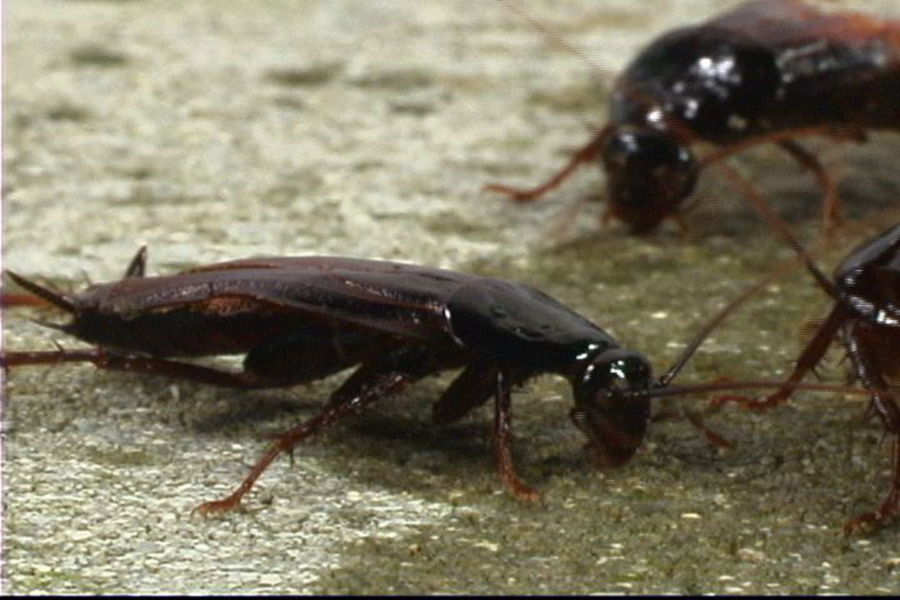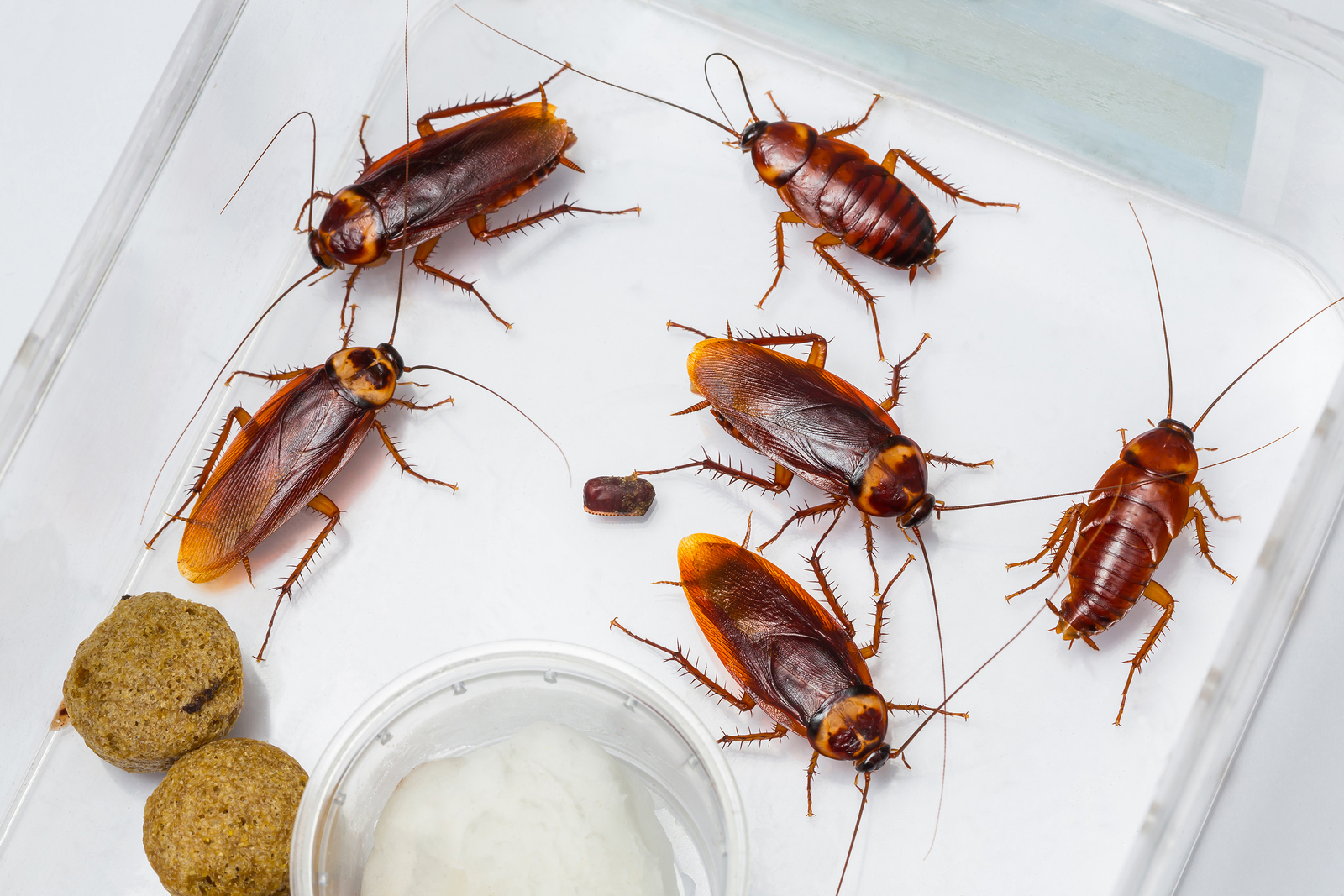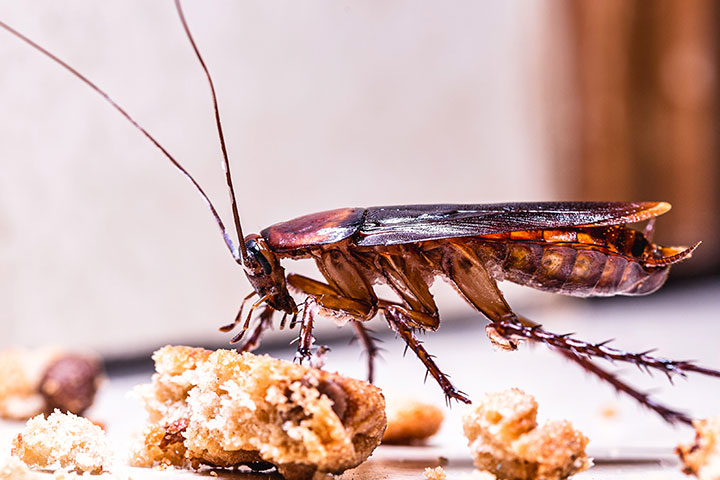Cockroaches can survive without food for up to one month, but they require water to live and will only survive for a week without it. These pests are opportunistic feeders, and they will consume almost anything they come across, including decaying organic matter, household items, and even soap and makeup.
Cockroaches are attracted to sugary and starchy foods, greasy foods, and animal proteins, so it’s important to keep food in airtight containers and clean up crumbs and spills promptly. We will explore the diet of cockroaches in more detail, discuss their feeding habits, and provide tips for preventing infestations.
By the end of this article, you will have a better understanding of what cockroaches eat and how to keep them out of your home.

Credit: www.orkin.com
What Do Cockroaches Eat?
When it comes to their eating habits, cockroaches are not picky eaters. They have a wide-ranging diet and can consume almost anything they come across. Let’s take a closer look at what cockroaches prefer to feast on.
Favorite Foods
Cockroaches have a particular affinity for sweets, starches, and animal proteins. These are their favorite foods, and they will actively seek them out. Additionally, they are attracted to greasy foods, cheese (especially if it’s moldy or fermented), and anything that has started to decay.
To prevent cockroaches from infesting your home, it’s essential to take extra care with sugary foods. Store them in airtight containers to deny the roaches access. It’s also crucial to clean up thoroughly after preparing meat and wipe down counters to remove any crumbs that may be left behind.
Nighttime Diet
What do cockroaches eat at night? During the darkness of night, cockroaches continue their relentless search for sustenance. They are particularly drawn to sweets and starchy foods, which provide them with a quick burst of energy. Greasy foods and meats also make up a significant portion of their nighttime diet.
Decaying Organic Matter
Cockroaches are not fussy eaters when it comes to decaying organic matter. They happily consume anything that has started to decompose, including rotting fruits and vegetables, dead animals, and fallen leaves. This makes them valuable contributors to the ecosystem, as they help break down and recycle organic waste.
Household Items
It may come as a surprise, but cockroaches have a taste for household items. They can feast on cardboard, book bindings, wallpaper glue, and even soap and makeup. This is why it’s crucial to keep your living space clean and clutter-free, as these items can attract and sustain cockroach populations.
In conclusion, cockroaches are scavengers with a diverse and adaptable diet. They can survive for long periods without food, but they will perish quickly without access to water. By understanding what attracts cockroaches and taking steps to eliminate their food sources, you can effectively control and prevent infestations in your home.

Credit: www.todayifoundout.com
How Long Can Cockroaches Live Without Food Or Water?
Cockroaches can survive without food for up to one month, but they cannot last more than a week without water. Their favorite foods include sweets, starches, and animal proteins, but they can eat just about anything, including decaying organic matter, household items, and even soap and makeup.
It is challenging to starve cockroaches to death, but keeping your home cool and dry can help control their population.
How Long Can Cockroaches Live Without Food or Water? Cockroaches are notoriously known for their survival skills and can withstand harsh living conditions. One such condition is the lack of food or water. Cockroaches can survive without food for up to one month, but they can only survive for one week without water. However, these survival times may vary based on the species of cockroach and the availability of other food sources.
Survival Without Food
Cockroaches are scavengers and can eat just about anything. They prefer sweets, starches, and animal proteins, but they can also eat cardboard, book bindings, wallpaper glue, and even soap and makeup. It’s nearly impossible to kill cockroaches via starvation as they’ll always find a secondary food source or even resort to cannibalism. However, the lack of food can affect their reproductive ability and growth rate.
Importance Of Water
While cockroaches can survive without food for a month, they can only survive for a week without water. Water is essential for their survival as it helps regulate their body temperature and keeps them hydrated. Cockroaches can obtain water from various sources such as condensation, leaky pipes, and even the humidity in the air. It’s crucial to keep your home cool and dry to reduce the availability of water sources for cockroaches. In conclusion, cockroaches can survive without food for up to a month, but they can only survive for a week without water. While it’s nearly impossible to starve them out, reducing their access to food and water can help control their population. Regular cleaning, proper food storage, and fixing leaky pipes are some ways to reduce the availability of food and water sources for cockroaches.
Can You Starve Out Cockroaches?
Cockroaches can survive without food for up to one month, but they need water to survive. While it’s difficult to starve them out completely, keeping your home cool and dry can make it harder for them to survive. Cockroaches prefer sweets, starches, animal proteins, greasy food, cheese, and decaying organic matter.
Can You Starve Out Cockroaches? Cockroaches are one of the most resilient pests, and they can survive in harsh environments. They are capable of going without food for up to a month, but they can only survive for a week without water. This raises the question: can you starve out cockroaches? The answer is not as simple as yes or no. While it is almost impossible to kill cockroaches via starvation, it is much harder for them to survive without water. Let’s explore the difficulty of starving cockroaches and the importance of keeping your home cool and dry.
Difficulty Of Starving Cockroaches
Cockroaches are omnivores, and they can eat almost anything, including cardboard, book bindings, wallpaper glue, and even soap and makeup. They are scavengers and will feed on whatever they can find. Therefore, it is almost impossible to starve them out completely. Cockroaches will always find a secondary food source or even resort to cannibalism to survive. However, you can reduce their food sources by keeping your home clean and free of clutter.
Keeping Your Home Cool And Dry
While it is difficult to starve cockroaches, it is much harder for them to survive without water. Cockroaches need water to survive, and they can only live for a week without it. Therefore, it is essential to keep your home cool and dry to reduce their water sources. Fix any leaky pipes or faucets and ensure that your home is well-ventilated. Cockroaches thrive in warm and humid environments, so keeping your home cool and dry can make it less hospitable for them. In conclusion, while it is difficult to starve cockroaches out, reducing their food and water sources can make your home less hospitable for them. Keeping your home clean, free of clutter, and cool and dry can help reduce their food and water sources, making it harder for them to survive. However, if you have a severe cockroach infestation, it is best to seek professional help to eliminate the problem.
How Often Do Cockroaches Eat?
Cockroaches are known for their ability to survive in various conditions, including periods without food. Understanding their feeding habits is essential for effective pest control. Let’s explore the feeding frequency and their survival without eating.
Surviving Without Eating
Cockroaches are cold-blooded insects, enabling them to survive without food for up to one month. However, they can only last about a week without water. This characteristic makes it essential to address both food and water sources when dealing with cockroach infestations.
Feeding Frequency
While cockroaches have the capability to survive without food for extended periods, they are generally opportunistic feeders and will consume a wide range of items. Their favorite foods include sweets, starches, animal proteins, greasy foods, and decaying organic matter. Maintaining a clean environment and sealing food sources are crucial in preventing infestations.
When dealing with cockroaches, it’s important to understand that they can survive for months without eating if provided with water. However, they are more likely to perish quickly if deprived of both food and water. Proper sanitation and eliminating water sources are essential in controlling cockroach populations.
Do Cockroaches Eat Each Other When They Run Out Of Food?
Cockroaches do not eat each other when they run out of food. Like any other living organism, they require food to survive, and if their food supply is gone, they will not resort to cannibalism.
Insects’ Need For Food
Cockroaches are known for their ability to survive in various environments, thanks to their remarkable adaptability. One essential aspect of their survival is their need for food. Like any other living creature, cockroaches require a steady source of nourishment to sustain themselves. Without a consistent supply of food, these resilient insects will go to great lengths to find sustenance.
Cannibalism Among Cockroaches
When it comes to cockroaches running out of food, a fascinating phenomenon occurs – cannibalism. Yes, you read that right! Cockroaches have been known to resort to eating each other when their primary food sources are scarce or depleted. This behavior is a survival instinct that allows them to sustain themselves when traditional food options are limited. In times of famine, cockroaches will turn on their own kind, consuming weakened or deceased members of their colony. This gruesome act may seem brutal, but it is a testament to their resourcefulness and adaptability. By cannibalizing their fellow cockroaches, they can prolong their own survival, even in the absence of a regular food supply. It’s important to note that cannibalism among cockroaches is not a common occurrence. They prefer to scavenge for decaying organic matter, starchy foods, sweets, greasy foods, and even household items like cardboard or book bindings. However, when all else fails, they will resort to devouring their own kind. In conclusion, cockroaches are opportunistic feeders, and when faced with a scarcity of food, they will turn to cannibalism as a means of survival. This adaptive behavior showcases their resilience and ability to thrive in adverse conditions. So, the next time you come across these resilient insects, remember that they are not only resourceful scavengers but also capable of resorting to cannibalism when faced with a food shortage.
What Other Food Sources Do Cockroaches Have?
Aside from human food sources, cockroaches have diverse eating habits and can thrive on a variety of organic matter found in their environment.
Eating Habits Other Than Humans
Cockroaches are opportunistic feeders, consuming a wide range of food sources. They are known to feast on decaying organic matter, such as fallen leaves, wood, and dead insects. Additionally, they can devour household items like cardboard, book bindings, wallpaper glue, and even soap and makeup.
Flesh-eating Cockroaches
Some species of cockroaches, such as the notorious flesh-eating cockroaches, have a particularly unsettling diet. These roaches are attracted to flesh, and they have been observed feeding on dead skin, fingernails, and open wounds of humans and animals. Although this behavior is rare, it highlights the adaptability and resourcefulness of these resilient insects.

Credit: www.pestworldforkids.org
Frequently Asked Questions
How Long Can Roaches Live Without Food?
Cockroaches can live without food for a month, but only survive a week without water.
What Is A Roaches’ Favorite Food?
Roaches’ favorite foods are sweets, starches, and animal proteins, as well as greasy, moldy, or fermented items. They are also attracted to crumbs and any food left out.
What Do Cockroaches Eat At Night?
Cockroaches eat sweets, starches, greasy foods, meats, cheese (especially moldy or fermented), decaying organic matter, household items like cardboard and book bindings, and even soap and makeup at night.
Conclusion
Understanding the eating habits of cockroaches is crucial for effective pest control. Cockroaches can survive for extended periods without food, but their need for water is more immediate. By eliminating food sources and maintaining a dry environment, you can effectively manage cockroach infestations.
Regular cleaning and proper food storage are essential in deterring these resilient pests.
Related posts:

I’m MD Tanvir, and I bring years of expertise gained from working closely with pest control companies to the forefront. My journey in the industry has inspired me to launch Bug Battler, a platform aimed at equipping people with the know-how to combat pests autonomously. Through Bug Battler, I aim to empower individuals with practical insights to tackle pest infestations effectively.

